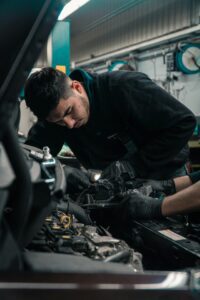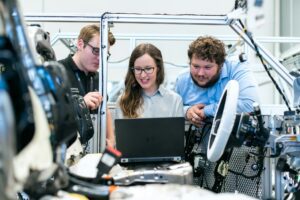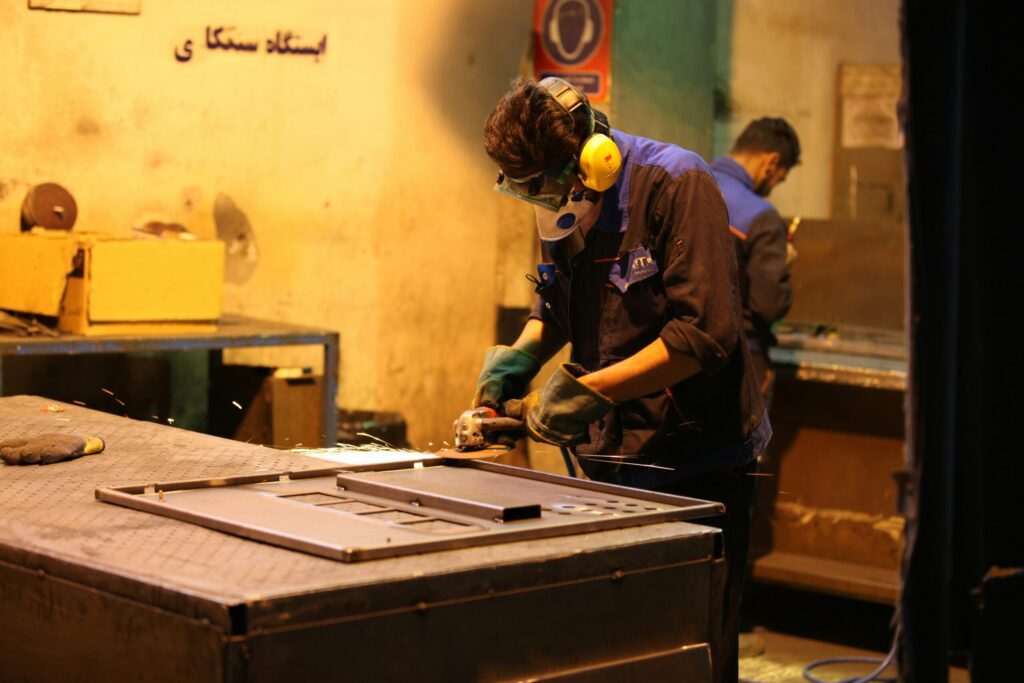 Mechanic schools in the USA are community colleges, universities, and vocational and technical schools that provide courses to prepare students for jobs as diesel, aircraft, or automotive technicians. These programs offer both academic instruction and practical training in the inspection, upkeep, and repair of machines and automobiles. They offer students the skills necessary to diagnose, maintain, and repair contemporary automobiles utilizing both conventional tools and cutting-edge computer-based equipment.
Mechanic schools in the USA are community colleges, universities, and vocational and technical schools that provide courses to prepare students for jobs as diesel, aircraft, or automotive technicians. These programs offer both academic instruction and practical training in the inspection, upkeep, and repair of machines and automobiles. They offer students the skills necessary to diagnose, maintain, and repair contemporary automobiles utilizing both conventional tools and cutting-edge computer-based equipment.
A solid foundation is offered by the USA mechanic schools to anyone who has a passion for engines, maintenance, and practical problem-solving. As cars become smarter and more complicated every year, there is a huge demand for qualified mechanics across the country. The practical experience and industry-recognized credentials offered by a U.S. mechanic school are essential for launching a prosperous career in the automotive sector, regardless of your professional goals, whether you want to work in a dealership, establish your own repair shop, or specialize in areas like collision repair or diesel engines.
Read Also: Online University Courses in the USA
Why Mechanic Schools in the USA
-
Capacity to solve problems
Identifying mechanical problems, carrying out regular maintenance, and utilizing specialized equipment to fix different vehicle parts are all part of the benefits of a mechanic school. The top car mechanics are problem-solvers by nature. When inspecting a car, they will use their imagination to find the source of a problem. These skills cannot be acquired easily; mechanic schools are where people learn them.
-
Communication abilities
An essential part of daily business operations is shop communication. A mechanic school graduate is a competent technician who is at ease answering clients’ queries and worries about auto repairs. They also work well with other team members, the shop owner, and other mechanics.
-
Attention to detail
When it comes to auto maintenance, attention to detail is crucial. A competent mechanic never overlooks any information when doing diagnostics. They go above and beyond in their physical inspections of cars to get every detail.
Read Also: Highest Paying Jobs Without a Degree in the USA
Top 7 Mechanic Schools in the USA
You are aware of the educational requirements and prospects for growth. Now, let’s review some of the top mechanic schools that can help you achieve your goals.
-
 Technical Institute of Rolla
Technical Institute of Rolla
The two-year Automotive Technology curriculum at Rolla Technical Institute aims to provide students with a complete understanding of the many facets of vehicle maintenance and repair. The curriculum is designed to cover a broad range of subjects that are necessary for anyone hoping to work as a trained professional in the automotive sector. Additionally, it holds ASE (National Institute for Automotive Service Excellence) certification, which guarantees that the institute follows the strictest guidelines for automotive education and training.
Building a strong foundation in auto shop safety, tools and equipment, and core engine concepts is the main goal of the first year, according to the university’s website. To prepare them for more advanced coursework the following year, students are also introduced to the fundamentals of light repair and automobile maintenance. The curriculum dives further into the technical facets of automobile technology as students advance into their second year. In order to better prepare students for the difficulties they would encounter in professional automotive environments, the program is designed to improve their diagnostic and repair skills.
-
University of Pittsburgh
Pittsburg State University’s Bachelor of Science in Automotive Technology Program is perfect for individuals who have a strong interest in vehicles and are eager to learn more and pursue a career in the automotive industry. The university’s website states that the program includes a wide range of subjects, including the complex operation of electronic systems in contemporary cars as well as engine dynamics and brake systems. In order to prepare students for the current automotive environment, the program also includes instruction on the newest developments in automotive technology. Students can use professional-grade tools and equipment in cutting-edge labs to obtain hands-on experience with real automobiles. Experienced teachers who bring a plethora of industry knowledge to the classroom are leading this hands-on training. It’s safe to argue that students graduate better equipped to handle the variety and rigors of the automotive sector.
-
 University of Walla Walla
University of Walla Walla
The automotive department at Walla Walla University provides a thorough and engaging education in automotive management and technology. Students enrolled in such programs gain a thorough understanding of car mechanics, system functions, and the causes of breakdowns. Students learn how to effectively diagnose and fix car issues utilizing cutting-edge tools and technology, with an emphasis on practical skills. The student-run car shop is a distinctive feature of Walla Walla University’s automotive curriculum. In addition to gaining priceless practical experience, students can earn money while they study. Their classroom education is reinforced by this hands-on approach, which also gives them practical experience, which is highly recognized in the automotive sector. They grant the following degrees:
- Automobile Technology Bachelor of Science degree: Automotive systems and repair are the technical core of this degree. The Bachelor of Science in Automotive Management program combines automotive technology and management concepts, equipping students for leadership positions in the mechanical sector.
- Associate of Science in Automotive Technology: For individuals who want to get into the profession right away, this degree offers fundamental information and abilities in automotive technology. Students who complete WWU’s mechanic school curriculum are prepared to begin working in the automobile sector after graduation. The 100% placement rate of the curriculum is evidence of its success.
-
University of Southern Adventists
A Bachelor of Science degree, an Associate of Technology degree, a minor, and a certificate program are among the academic options available in Southern Adventist University’s extensive Automotive Technology curriculum. This diversity supports a range of automotive-related professional goals. According to the program’s website, these are some of its highlights. The program’s unique combination of classroom instruction and real-world experience is one of its best features. The university’s full-service auto shop, which repairs cars for locals, offers students practical experience. For a better understanding of car mechanics, systems, and typical problems, this experience is essential.
The curriculum makes sure that students use a variety of tools and diagnostic equipment to successfully understand and apply the theories. The program incorporates a practicum in the last semester, where students work eight to ten hours weekly in nearby car shops. This practical experience is crucial for comprehending the daily activities of a competent vehicle repair shop. By enabling students to take Automotive Service Excellence (ASE) exams to earn ASE Certification, the curriculum also promotes professional growth. The student’s proficiency in automotive technology is demonstrated by this industry-recognized certification.
-
Northwestern Ohio University
An innovative Bachelor of Automotive Technology Supervision (ATS) degree is available from the University of Northwestern Ohio. By adding advanced industry and business management classes to the curriculum, it aims to elevate students’ technical education to a new level. The institute’s website states that this curriculum follows a 2+2 methodology. In a similar field, such as Automotive, Agricultural Equipment, High Performance, Diesel, or Automotive Management Technology, students first earn an associate’s degree. Students go on to their junior and senior years at UNOH to finish the Bachelor of Automotive Technology Supervision after earning their Associate Degree.
-
University of Ferris
Ferris State University provides a variety of programs that address different facets of the automobile industry because of its extensive experience in automotive education. Students who complete these programs are ready to succeed in the rapidly changing automotive technology and service industry. Some of its programs include:
- Technology for Automotive Services: This program emphasizes practical instruction in diagnostics, preventive maintenance, and auto repair and maintenance. For hands-on experience, students work with more than 100 automobiles given by manufacturers. Graduates can go on to become managers, shop supervisors, or service technicians. They can also choose to continue their education in management or automotive engineering technology.
- Technology for Automotive Engineering: The technical and engineering facets of vehicle design and manufacture are the focus of this program. It prepares graduates for positions in automotive design, testing, and manufacturing by fusing engineering principles with practical technical abilities.
- Management of Automobiles: This curriculum is perfect for anyone looking for leadership positions in the automotive industry since it combines technical automotive knowledge with business and management skills. It equips students for jobs in the automobile industry, ranging from corporate positions in automakers to dealership management.
- Technology for Heavy Equipment Service Engineering (HSET) : Heavy equipment systems, such as trucks, farm equipment, and construction machines, are the emphasis of HSET. For individuals interested in a specialized profession in heavy equipment maintenance and repair, the curriculum is appropriate. Ferris State University offers certifications in fields like Performance Motorsports” and “Performance Machining” in addition to these degree programs, giving students the chance to further specialize in particular automotive specializations.
-
Institute of Science and Technology in Central Pennsylvania
The Central Pennsylvania Institute of Science and Technology’s (CPI) Automotive Technology Program is designed to keep up with the changing needs of the automotive service sector. The work of automotive service personnel has changed dramatically as cars become more complicated, including advanced computers and electronic systems. Students who complete this program will have a broad range of skills needed in this high-tech industry. The Automotive Technology Program has the following important components:
- Thorough understanding: Pupils gain a thorough understanding of a variety of vehicle technologies, such as electric, conventional petrol, and alternative fuels like ethanol.
- High-level technical skills: Students gain knowledge of how modern cars’ intricate computer systems and integrated electronic systems affect performance.
- Advanced diagnostic training: As automatic technology continues to improve, students receive instruction in the use of digital manuals, reference materials, and electronic diagnostic tools—all crucial skills.
- Traditional and modern methods are balanced: The curriculum guarantees competence with both contemporary technology and conventional hand tools, resulting in an adaptable skill set.
- Integration of theory and practice: Students can properly examine, maintain, and repair a wide variety of cars because of the program’s integration of theoretical knowledge with real-world experience.
- Preparation for professional certifications: This includes instruction for certifications that improve professional credentials, such as PA State Inspection, Emissions, MACS, SP2, and ASE.
Also, transfer students having an Associate’s degree from another university are accepted by the institute. The ATS curriculum gives students the skills they need to take on leadership responsibilities in a variety of automotive environments, including repair shops, dealerships, and service centers. Additionally, students study important business management ideas that will help them.
Read Also: Heavy Equipment Operator Jobs in the USA
What should I expect from Mechanic Schools?
-
 Practical instruction
Practical instruction
Learning by doing is the main focus of practical training in a mechanical school. Using top-notch equipment and working on actual or model cars, you’ll be in the workshop for a considerable length of time. Your teachers will keep an eye on your development, point out errors, and teach you effective and safe methods to finish each assignment. To build real-world skills, a large amount of the curriculum consists of hands-on, practical work.
-
Partnerships with the industry
Since modern automobiles rely significantly on software and electronic controls, academic training frequently covers topics like engine mechanics, electrical systems, fuel technology, hydraulics, algebra, and even computer diagnostics. To help you understand why things work the way they do rather than merely how to fix them, instructors simplify important subjects into easy-to-follow lectures. To keep their curricula current with emerging technologies, several colleges collaborate with manufacturers and business executives.
-
Specialisation
You may decide to focus on a particular field, such as high-performance automobiles, automotive restoration, or aircraft mechanics, depending on the curriculum. You can hone your abilities and differentiate yourself in the field by specializing. Training becomes more in-depth and practical in these programs. You’ll use cutting-edge equipment, identify challenging issues, and deal with actual situations that experts in that industry deal with daily.
-
Certification preparation
Professional certifications like ASE (Automotive Service Excellence) are frequently obtained via programs. Your classes are designed to prepare you for certification from the start. In addition to teaching you how to diagnose electrical systems and repair engines, instructors also assist you in comprehending the norms and practices that are employed in the workplace. Similar to a certification exam, you will study comprehensive manuals, go over test-style questions, and learn how to approach difficulties methodically.
Read Also: Electrician Trade Schools in the USA
5 Best Mechanic School Certificates
The majority of automotive mechanics seeking employment are unclear about which certifications to pursue. We will take care of that for you. We have now set down a few educational requirements for mechanic schools for you:
-
A high School Diploma
Becoming an auto mechanic requires at least a high school degree. This will equip you with the fundamentals of reading, writing, and math so that you can communicate clearly. Additionally, it will help you strengthen that component of your possible consumer contacts by utilizing your people skills.
-
Internship
You can gain some initial, practical experience in the subject by working as an intern at an auto repair company. Additionally, it will help you determine whether the career is truly appropriate for you. Make contact with nearby stores to find out whether they provide this kind of opportunity.
-
A Bachelor’s Degree
Completing a two-year associate degree from a community college or other vocational institution may be mandatory for certain employers. These degree programs provide you with both practical and theoretical expertise. They will give you the general skills you need to operate cars and diagnose and repair issues.
-
Certification by ASE
To demonstrate your mechanical abilities, you must obtain an Automotive Service Excellence (ASE) certification. Qualified technicians are distinguished from the rest by this high standard. ASE-certified mechanics are still in great demand because of the industry’s severe technician shortage.
-
Ongoing education
The automobile sector is still changing. You will need to keep up with the latest developments in the business. This is because of new technologies like ADAS and electric vehicles (EVs). Gaining new abilities will enable you to serve your customers in your shop more effectively.
Read Also: Highest Paying Jobs Without a Degree in the USA
Conclusion
Attending mechanic schools in the USA is practical towards a secure and fulfilling job, not merely a way to study how engines operate. Students learn how to analyze, solve problems, and operate like actual experts through classroom education and hands-on shop experience. They learn useful skills, become proficient with industry tools, and become ready for important certifications that can help them stand out in a crowded job market. Mechanic schools give students the groundwork they need to succeed in the automotive industry. This is regardless of their chosen specialization: engines, electronics, diesel systems, or collision repair. Qualified mechanics are in great demand as modern cars become smarter and more sophisticated, and this demand is only growing. A mechanic school in the USA provides a solid foundation for anyone who appreciates technology, problem-solving, and manual labor. They lead to fulfilling employment and long-term prospects in the automotive sector.
 Technical Institute of Rolla
Technical Institute of Rolla  University of Walla Walla
University of Walla Walla Practical instruction
Practical instruction




